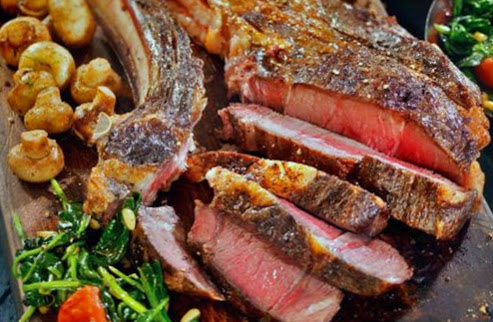Both nutrition and physical activity are critical if you want to gain lean muscle.
To get started, it's essential to challenge your body through physical activity. However, without proper nutritional support, your progress will stall.
High-protein foods are very important for gaining muscle, but carbohydrates and fats are also necessary sources of energy.
If your goal is to gain lean muscle, you should focus on exercising regularly and eating more calories each day from muscle-building foods.
Here are some of the foods for gaining lean muscle:
1. Eggs
Eggs contain high-quality protein, healthy fats and other important nutrients like B vitamins and choline.
Proteins are made up of amino acids, and eggs contain large amounts of the amino acid leucine, which is particularly important for muscle gain.
Also, B vitamins are critically important for a variety of processes in your body, including energy production.
2. Salmon
Salmon is a great choice for muscle building and overall health.
Each 3-ounce (85-gram) serving of salmon contains about 17 grams of protein, almost 2 grams of omega-3 fatty acids and several important B vitamins.
Omega-3 fatty acids play an important role in muscular health and may even increase muscle gain during exercise programs.
3. Chicken Breast
There's a good reason why chicken breasts are considered a staple for gaining muscle.
They are packed with protein, with each 3-ounce (85-gram) serving containing about 26 grams of high-quality protein.
They also contain generous amounts of the B vitamins niacin and B6, which may be particularly important if you are active.
These vitamins help your body function properly during the physical activity and exercise that's necessary for optimal muscle gain.
What's more, some research has shown that higher-protein diets containing chicken may aid fat loss.
4. Greek Yogurt
Dairy not only contains high-quality protein, but also a mixture of fast-digesting whey protein and slow-digesting casein protein.
Some research has shown that people experience increases in lean mass when they consume a combination of fast- and slow-digesting dairy proteins.
However, not all dairy is created equal.
For example, Greek yogurt often contains approximately double the amount of protein as regular yogurt.
While Greek yogurt is a good snack anytime, eating it after a workout or before bed may be beneficial due to its mixture of fast- and slow-digesting proteins.
5. Tuna
In addition to 20 grams of protein per 3-ounce (85-gram) serving, tuna contains high amounts of vitamin A and several B vitamins, including B12, niacin and B6. These nutrients are important for optimal health, energy and exercise performance.
Additionally, tuna provides large amounts of omega-3 fatty acids, which may support muscle health.
This may be particularly important for older adults. Research has shown that omega-3 fatty acids can slow the loss of muscle mass and strength that occurs with age.
6. Lean Beef
Beef is packed with high-quality protein, B vitamins, minerals and creatine.
Some research has even shown that consuming lean red meat can increase the amount of lean mass gained with weight training.
However, even when you're trying to gain muscle, it may be best to choose beef that supports muscle gain without providing too many extra calories.
For example, 3 ounces (85 grams) of 70% lean ground beef contains 228 calories and a whopping 15 grams of fat.
However, the same amount of 95% lean ground beef contains slightly more protein and only 145 calories and 5 grams of fat.
7. Shrimp
Shrimp are almost pure protein. Each 3-ounce (85-gram) serving contains 18 grams of protein, 1 gram of fat and zero carbs.
While healthy fats and carbs are important in your overall diet, adding some shrimp is an easy way to get muscle-building protein without too many additional calories.
Like many other animal proteins, shrimp contains a high amount of the amino acid leucine, which is necessary for optimal muscle growth.
8. Soybeans
Half a cup (86 grams) of cooked soybeans contains 14 grams of protein, healthy unsaturated fats and several vitamins and minerals (23).
Soybeans are a particularly good source of vitamin K, iron and phosphorus.
Iron is used to store and transport oxygen in your blood and muscles, and a deficiency can impair these functions.
Young women may be particularly at risk of iron deficiency due to blood loss during menstruation







